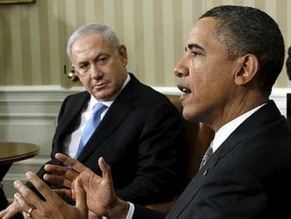|
World Jewish News

Prime Minister Netanyahu and President Obama. Photo by: Reuters
|
U.S. believes Israel sees Iran nuclear problem 'too narrowly'
09.02.2012, Israel and the World Differences between Israel and the U.S. over Iran are currently focused on what Defense Minister Ehud Barak has coined the “zone of immunity” of Iran’s nuclear program, the New York Times reported on Thursday.
The White House and the U.S. administration in general do not agree with Barak’s use of the term, and even see it as “too narrow,” the New York Times said.
U.S. officials told the newspaper that, as opposed to Barak, Prime Minister Netanyahu does not use the term “zone of immunity,” at least not in public.
The newspaper reported that one official thought that Netanyahu's remarks recently that Israeli officials should “shut up” about Iran was a welcome move.
"I think that’s good advice,” one of the American officials told the New York Times.
According to the report, the phone conversation between President Barack Obama and Netanyahu last month was intended to help the U.S. understand Israel’s position regarding an attack on Iran. During the conversation Obama tried to give Netanyahu arguments against a strike on Iran at this time.
U.S. officials said that the feeling in the Obama administration after the conversations was Netanyahu was willing to see whether sanctions and other steps would work, the newspaper said.
American officials said that tensions between Israel and the U.S. have also increased regarding the Palestinians, and particularly regarding the question of the West Bank settlements.
President Obama ordered U.S. government officials not to allow the topic to enter talks with Israel over Iran, and to carry out talks over Iran’s nuclear program “without politics.” Obama will continue to discuss the topic with Netanyahu during his visit to Washington at the beginning of March.
U.S. government officials added that after a period in which the U.S. had doubts over Israel’s intentions at the end of 2011, the two sides are currently communicating better over the matter. According to U.S. officials, Obama’s interview with NBC a few days ago was a recognition of this. In the interview, Obama said that he does not think that Israel has already decided whether or not to attack Iran.
According to the New York Times, the U.S. and Israel are carrying out intense talks over when Iran’s nuclear program will enter the so-called “zone of immunity,” and whether this situation can even become a reality.
American officials claim that the term is “ill-defined” and that they are frustrated that Israel sees the problem “too narrowly,” especially in light of the evidence that sanctions are having an impact on Iran. The Americans are sure that there are many more ways to damage the Iranian nuclear program than to carry out a military strike.
The Israeli view, led by Ehud Barak, holds that when the Iranians move all uranium enrichment activities to bunkers in a mountain next to the city of Qom, they will deport all UN International Energy Agency inspectors, and it will no longer be possible to stop their nuclear armament efforts, even though the process will take another few years to complete.
The New York Times reported an American official as saying that, essentially, “the argument the Israelis make is that once the Iranians get an "impregnable breakout capability," meaning a place that will not be harmed by a military strike, "it makes no difference whether it will take Iran six months or a year or five years" to manufacture nuclear weapons.
The American approach is different. “There are many other options" to stopping Iran's nuclear program, a U.S. official told the New York Times.
According to the newspaper, these options include stopping Iran's oil revenues, targeting facilities that provide centrifuge, or targeting facitilties installations where the Iranians would turn enriched uranium into a weapon.
By Barak Ravid
Haaretz.com
|
|
